
Natural Remedies for High Blood Pressure
Go for a walk
Just a little exercise can make a difference. An Australian study published in the journal Hypertension found that a 30-minute morning walk may be as effective as medication at lowering blood pressure for the rest of the day. If you’re currently sedentary, try starting with a 10-minute walk (walk five minutes, turn around, and come back) and work your way up to 30 minutes. (Find out what happens to your body when you start walking 10,000 steps a day.)
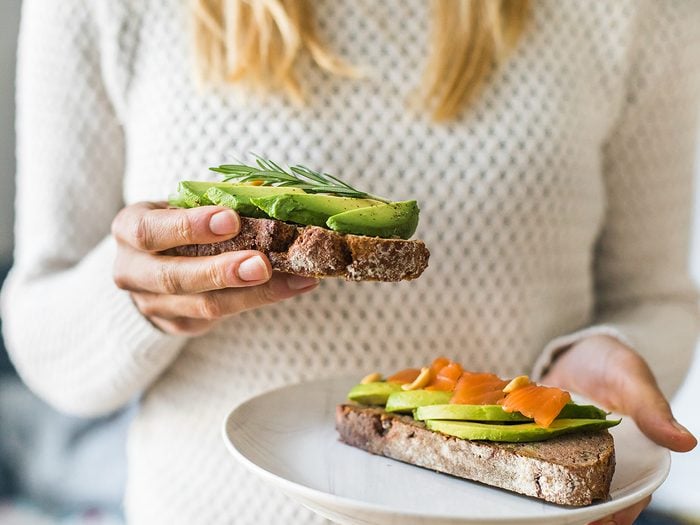
Load up on potassium
Potassium—sometimes called the “un-salt”—can lower blood pressure, says cardiologist Harlan Krumholz, MD, professor of medicine at Yale School of Medicine and director of the Yale Center for Outcomes Research and Evaluation in New Haven, Connecticut. That’s because potassium lessens the effects of sodium. The more potassium you eat, the more sodium you lose through urine. Potassium also helps to ease tension in your blood vessel walls, which helps further lower blood pressure.
And yet, fewer than than two percent of us get the recommended daily intake. “Many foods—including avocados, beans, spinach, and raisins—are replete with potassium,” says Dr. Krumholz. In fact, avocados pack in more potassium than any other vegetable or fruit, including bananas. Add some to your sandwich or salad for a nutritional boost.
Brush up on the incredible health benefits of avocado.
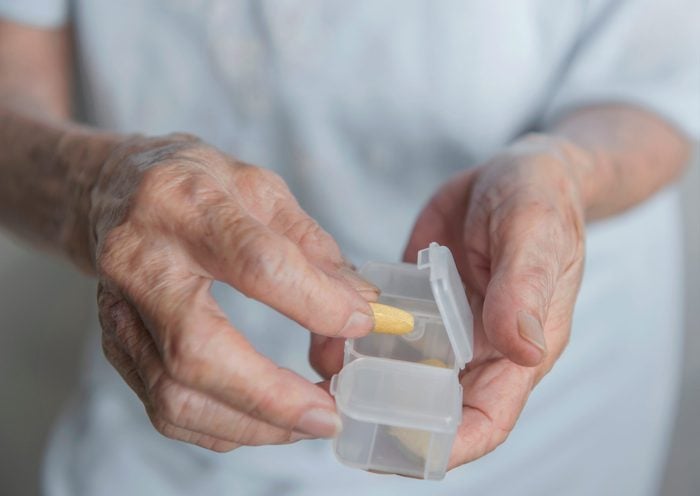
Schedule your medication
If you’ve started taking blood pressure-lowering medication but still aren’t seeing reduced numbers, it could be that you’re missing a dose here and there. In a study published in BMC Health Services Research exploring why people with chronic diseases don’t take their prescribed meds, 62 percent said it was because they forgot.
To get into the habit of taking your meds as prescribed, try one of these tricks: Set a reminder on your phone or watch to go off at the same time every day; sync up your med-taking with an activity you do at the same time every day (making the morning coffee or brushing your teeth, for example); or place a reminder note someplace you can’t miss it, like the bathroom mirror or refrigerator.
Find out how to improve heart health in six easy steps.
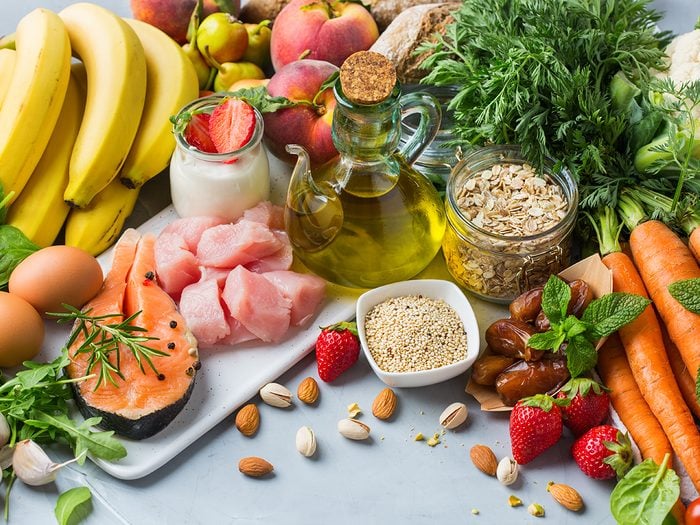
Eat a well-balanced diet
It’s the single most important lifestyle change you can make if you’re looking to lower your blood pressure, says Dr. Krumholz. Aim to eat a diet that’s rich in fruits and vegetables, whole grains, low-fat dairy products, skinless poultry and fish, nuts and legumes, and non-tropical vegetable oils.
An easy way to satisfy every category on that list? “The DASH diet (Dietary Approaches to Stop Hypertension) has high-quality evidence to support the value of a diet rich in fruits, vegetables, and low-fat dairy foods in lowering blood pressure,” says Dr. Krumholz. “The benefit for blood pressure can begin within two weeks.”
Don’t miss our ultimate guide to healthy grocery shopping.
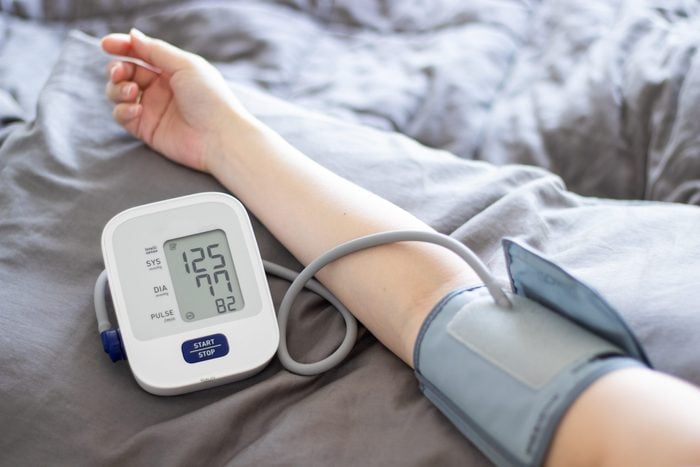
Invest in a home blood pressure kit
The American Heart Association recommends home blood pressure monitoring for everyone with high blood pressure. This helps doctors determine whether treatments are working. (This is not a substitute for regular visits to your doctor, however.) Ask your health-care provider for a brand recommendation, and bring it to the office so your doctor can observe you using it and be sure you’re doing it correctly.
Here’s expert advice on how to measure blood pressure accurately.
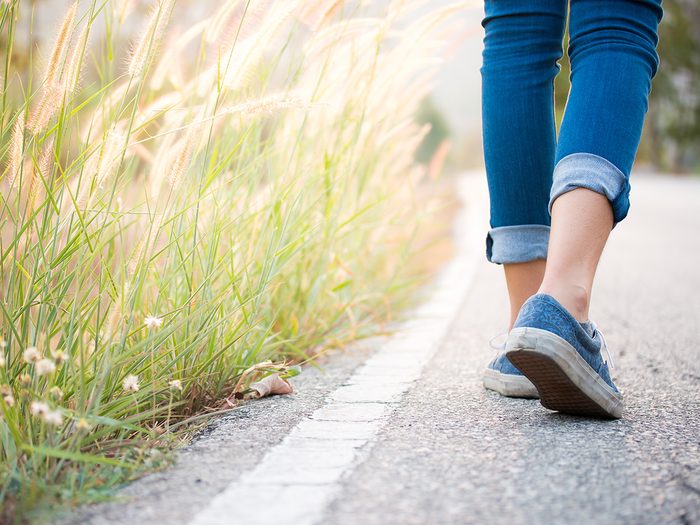
Break up periods of uninterrupted sitting
Research links prolonged sitting with obesity and a cluster of conditions—increased blood pressure, high blood sugar, excess body fat around the waist, and abnormal cholesterol levels—that make up metabolic syndrome. One study, published in 2018 in the Journal of Occupational and Environmental Medicine, suggests that breaking up prolonged sitting with bouts of light physical activity may reduce blood pressure in people with hypertension.
Although experts “are still learning about what kind of patterns of activity or inactivity have consequences for health,” says Dr. Krumholz, “you should punctuate the day with periods of activity.” Every half hour, get up and stretch, walk, or do some other form of light activity. Another trick: Return e-mails, texts, and phone calls standing up.
Learn to spot the signs you need to move more.
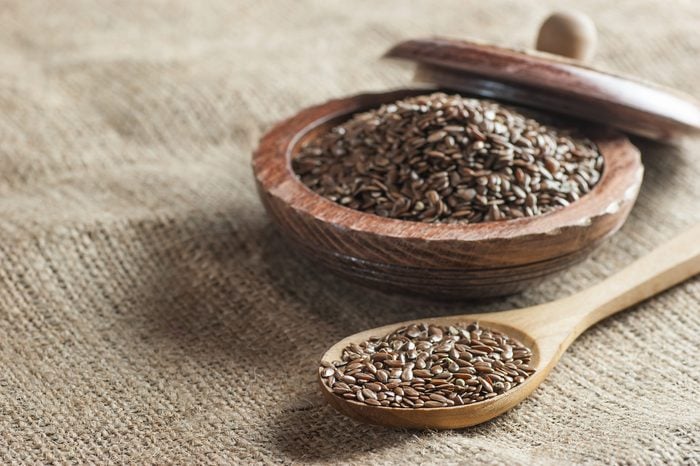
Eat flaxseed
Consuming four tablespoons of flaxseed can lower systolic blood pressure (the top number) in postmenopausal women who have a history of heart disease, a small study in the Journal of Nutrition found. The seeds are rich in omega-3 fatty acids, which probably explains the effect. Try two tablespoons in your oatmeal or yogurt at breakfast, then sprinkle 2 tablespoons over soup or salad later in the day for a tasty crunch.
Find out the heart attack symptoms that are most frequently misdiagnosed.
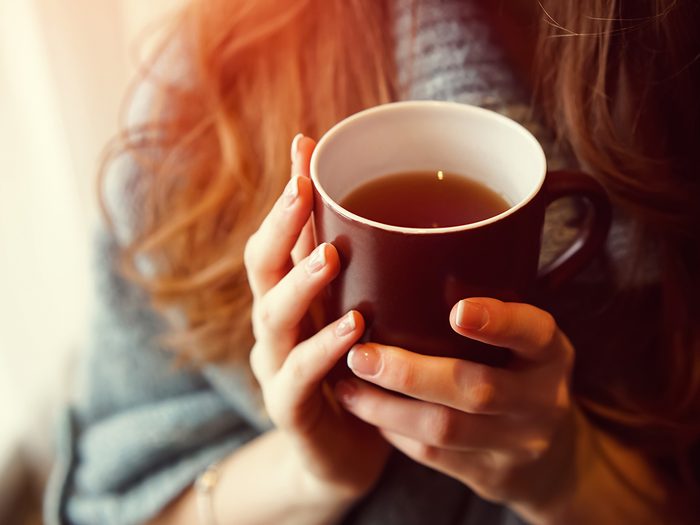
Drink tea
A wide body of research, including a Chinese study of more than 4,500 adults published in the Journal of Nutrition, Health, and Aging, shows that tea contributes to decreased blood pressure. For every cup of tea you drink a day, systolic blood pressure could reduce by two points and diastolic pressure by one point, according to an Australian study. More than four cups, though, and the same benefits won’t show.
Check out the powerful health benefits of tea.
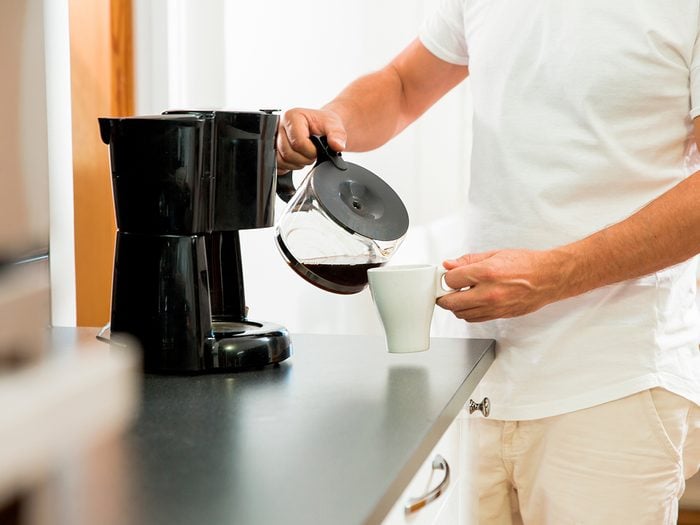
…But limit coffee consumption
Coffee isn’t off-limits for people with high blood pressure, but moderation is key, found a large review of studies published in 2017 in Expert Review of Cardiovascular Therapy. That regular cup of joe may increase blood pressure for up to three hours after you drink it. But if you’re a regular coffee drinker, the effect is diminished.
Here’s what your daily dose of caffeine does to your body.

Practice meditation
Developing a regular meditation practice can help reduce blood pressure and stress, suggests a study published in 2019 in Journal of Human Hypertension. “Managing the stressful aspects of life is particularly important for people with high blood pressure,” says Dr. Krumholz. “It’s not about fully eliminating stress, but about developing the skills to mitigate its effects.” Every day, carve out five minutes to sit quietly and repeat a simple mantra like “Breathe.”
These five-minute meditations are a great place to start.
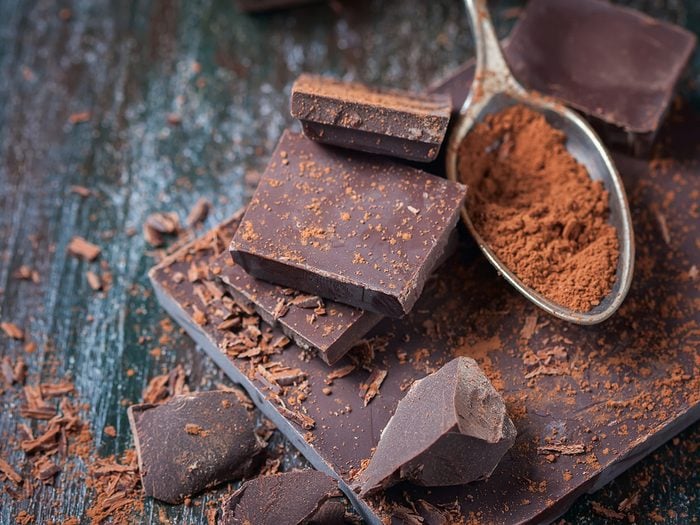
Enjoy dark chocolate
Milk chocolate is the most commonly consumed chocolate in North America—but it’s dark chocolate that can benefit your health. Most dark chocolate is high in flavonoids, particularly a subtype called flavanols that is associated with a lower risk of heart disease, according to the American Heart Association. Flavanols have been shown to support the production of nitric oxide in the inner cell lining of blood vessels that helps to relax the blood vessels and improve blood flow, thereby lowering blood pressure, according to the Harvard T.H. Chan School of Public Health. Some studies suggest chocolate or cocoa consumption is associated with a lower risk of high blood pressure in adults. Limit yourself to a 1-ounce square, and choose 70 percent dark chocolate or higher.
Discover 50 daily habits that slash your risk for heart disease.
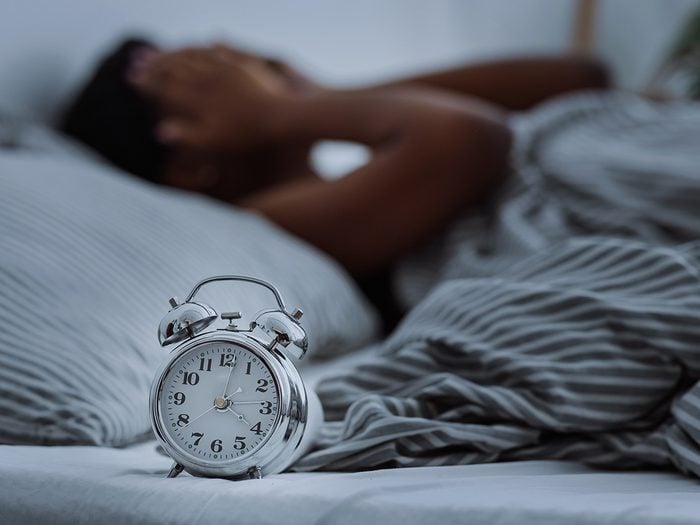
Wear earplugs when you sleep
A study published in 2019 in Psychosomatic Medicine shows a link between poor sleep habits and high blood pressure. One of the culprits? Noise! Research suggests that being exposed to noise—even while sleeping—can increase your blood pressure and heart rate. That’s why the National Sleep Foundation recommends wearing earplugs at night, especially if you live in a noisy environment.
Here’s more expert advice for a good night’s sleep.

Adopt a pet
Here’s a good excuse to get a pet: A review of studies published in Circulation shows that having one—especially a dog or a cat—improves cardiovascular health. And some of the studies have found a specific connection between pet ownership and lower blood pressure.
Find out more proven health benefits of pet ownership.
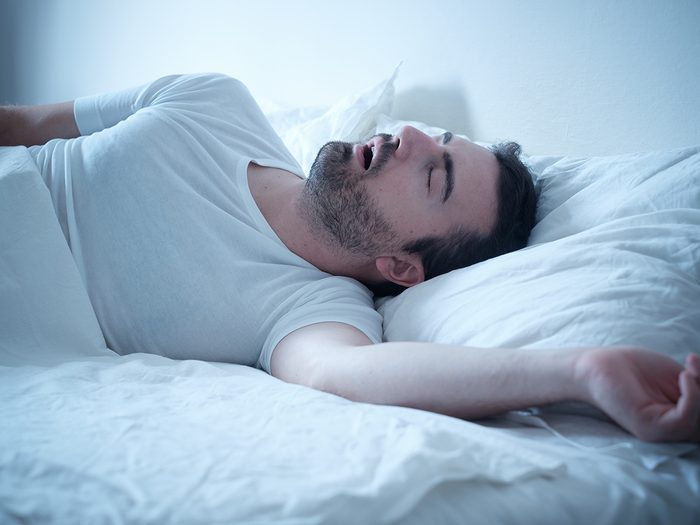
Assess your sleeping habits
Obstructive sleep apnea is a recognized cause of high blood pressure. In fact, about half of the people who have sleep apnea also have high blood pressure, according to a position paper published in Hypertension. The sleep disorder, in which breathing stops and starts dozens or hundreds of times a night, can be recognized by loud snoring or excessive tiredness during the day.
Follow our ultimate sleep hygiene checklist to achieve the deep, restful sleep of your dreams.
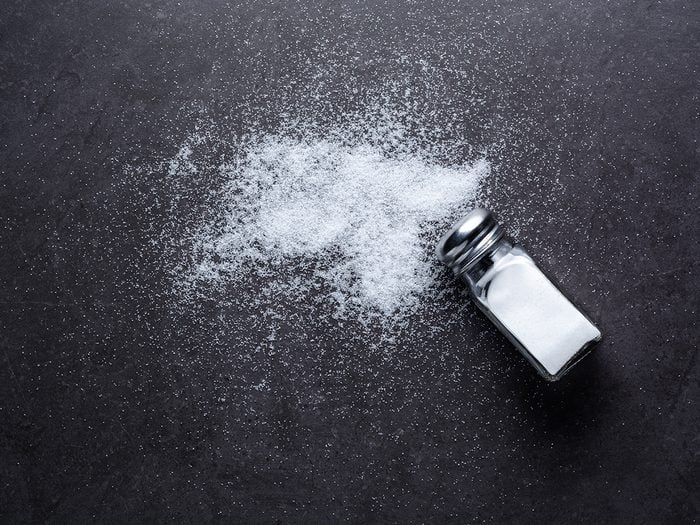
Slash your salt intake
We all know about the link between hypertension and sodium: Slashing your sodium intake not only decreases blood pressure, but it can also lower your risk of cardiovascular disease, as countless studies—including a 2019 review of research published in Nutrients—have shown.
We need only 500 mg a day for the body to perform vital functions. But most of us consume 3,400 mg every day, on average. To shake the salt habit, try swapping salt for spices, herbs, and flavourings like garlic, parsley, and allspice. And don’t forget that sodium hides in unlikely places, like many breakfast cereals, salad dressings, soups, and tortillas. Every day, try to identify one source of sneaky salt and find a low-sodium replacement.
Find out all the ways salt is making you sick.
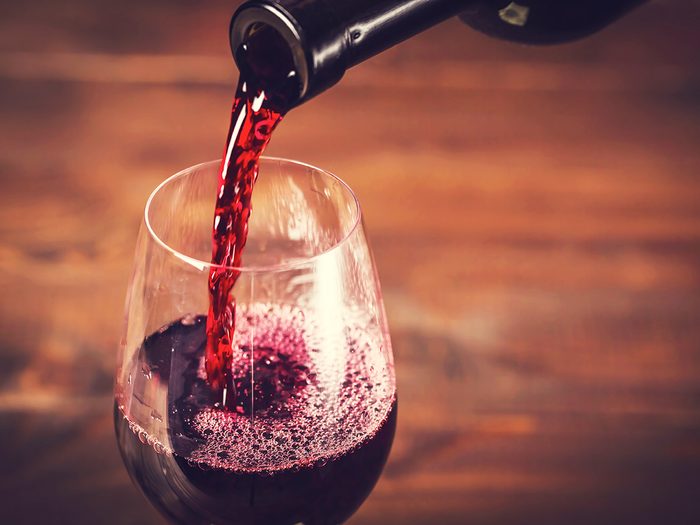
Limit alcohol
Drinking alcohol increases your odds of high blood pressure, especially if you drink excessively, according to a study published in 2018 in PLoS One. If you drink, the AHA suggests limiting your intake to no more than two drinks per day (for men) and one per day (for women). A drink is one 12-ounce beer, a 4-ounce glass of wine, 1.5 ounces of 80-proof spirits, or an ounce of 100-proof spirits.
“Excess alcohol may directly raise blood pressure, but there may also be indirect negative effects,” says Dr. Martin. “Alcohol can be accompanied by an overall poor diet, leading to weight gain, which can increase blood pressure. If you already have high blood pressure and exceed the AHA’s recommended limits on alcohol consumption, the risks may be even greater.”
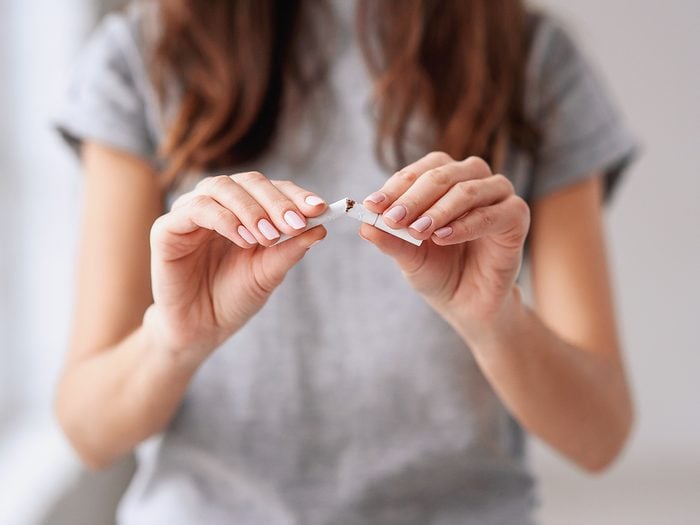
Stop smoking
Smoking is a proven risk factor for heart attack and stroke, but experts are still trying to get a handle on its connection to high blood pressure. This much is certain: “When you smoke, the nicotine can raise your blood pressure in the short-term,” says preventive cardiologist Seth Martin, MD, associate professor of medicine at Johns Hopkins University School of Medicine in Baltimore. “In the long-term, the hardening of the arteries can raise blood pressure.”
Exposure to secondhand smoke also increases the risk for the buildup of fatty substances known as plaque inside the arteries—a process that high blood pressure is known to accelerate.
Now that you’re familiar with these natural remedies for high blood pressure, find out how it’s actually possible to reverse heart disease.